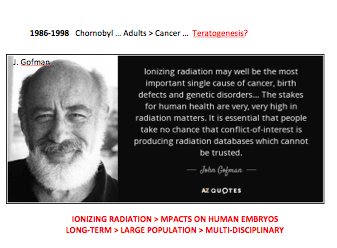Experts present startling findings around Fukushima and Chernobyl at commemorative event

Beyond Nuclear held a stimulating afternoon and evening of presentations, panel discussions and short films to commemorate the 30th anniversary of the Chernobyl nuclear disaster and the 5th anniversary of the still on-going Fukushima nuclear catastrophe. The event took place on May 3rd at the Goethe-Institut in Washington DC and was also supported by the Heinrich Böll Foundation North America. Beyond Nuclear is also very grateful to our member cosponsors: James Cromwell, Alice and Lincoln Day, Dr. Ian Fairlie, Judi and Lou Friedman, Jay Hormel, Redwood Alliance, and Carolyn and Roy Treadway.
The following is a brief summary of the event. The Power Points for each of the speakers are embedded under their names in the text below and are available for download and review (but not for re-use without permission from the authors.)
The first afternoon panel — Chernobyl and Fukushima: Effects on humans, animals & nature — featured presentations from:
Dr. Timothy Mousseau, Professor of Biological Sciences, University of South Carolina. Mousseau discussed his many studies on the health impacts on wildlife and biota around Chernobyl and Fukushima which soundly debunk the notion that animals there are “thriving.”
Dr. Wladimir Wertelecki, former chair, University of South Alabama Department of Medical Genetics, physician and geneticist. Wertelecki recounted the findings of birth defects and other health disturbances, particularly in Polissa, Ukraine, among not only those who were adults at the time of the Chernobyl disaster, but their children who were in utero at the time and, most disturbingly, their later offspring.
Lucas Hixson, Beyond Nuclear board member, and independent nuclear researcher. Hixson discussed the radiation findings taken during his recent 10-day visit to Chernobyl. He is also managing editor of an on-line nuclear news site: Enformable. See Lucas' Power Point here.
The second afternoon panel — Chernobyl and Fukushima: the essential lessons — featured:
Dr. Yuri Hiranuma, a Japanese but U.S.-based doctor and member Physicians for Social Responsibility Radiation & Health Committee. Hiranuma has read and analyzed many medical documents coming out of Japan and is a strong skeptic of official statements about the health impacts from Fukushima, especially thyroid cancers, which she views as likely far worse than is publicly acknowledged. See Yuri's Power Point here.
Paul Gunter, director of Reactor Oversight at Beyond Nuclear. Gunter discussed the absence of mandatory distribution of potassium-iodide (KI) to U.S. reactor communities, the foundation of a new Beyond Nuclear initiative — Got KI? He also addressed the lessons not learned and unlearned post-Fukushima regarding the failure of the U.S. Nuclear Regulatory Commission to require installation of hardened filtered vents in all 31 U.S. Fukushima-style reactors. See Paul's Power Point here.
Cindy Folkers, Radiation and Health Specialist at Beyond Nuclear. Folkers talked about post-accident health impacts beyond solid cancers, including leukemias, embryonic damage and blood damage. She also addressed efforts underway in the U.S. to potentially weaken radiation exposure standards and the burden that is already borne by our most vulnerable. See Cindy's Power Point here.
The evening session featured two films: Alone in the Zone, that tells the story of Naoto Matsumura, a 53-year-old fifth-generation rice farmer who stayed in the Fukushima exclusion zone to tend his — and eventually many other — animals.
Champion in Chernobyl features international tennis star, Maria Sharapova, whose family moved from her native Belarus when she was in her mother’s womb to escape the effect of Chernobyl. Seeing herself as a Chernobyl survivor, her charitable foundation helps provide scholarships for children from Belarus affected by the Chernobyl disaster.
This was followed by a panel discussion with the afternoon speakers as well as Beyond Nuclear’s Radioactive Waste Watchdog, Kevin Kamps, about the many health implications of the two disasters and efforts to “normalize” radiation in order to minimize preventive efforts and subsequent mitigation.
Lessons from Fukushima and Chernobyl
The Risks of "Normalizing" Radiation: A Special Event


Leading international experts and compelling short films will headline a May 3rd Beyond Nuclear event in Washington, DC to mark the anniversaries of the Chernobyl and Fukushima nuclear disasters. Full program.
Beyond Nuclear and the Goethe-Institut, DC will co-host an afternoon and evening program that will mark the 5th anniversary of Fukushima and the 30th anniversary of Chernobyl. The legacy of both nuclear power plant disasters has included a marked increase in radiation-induced diseases and mutations, as found by some of the world’s leading researchers, several of whom will be speaking at the event.
The event takes place at the Goethe-Institut, DC, 1990 K St. NW (event entrance on 20th St.) The afternoon panel presentations run from 2pm to 5pm. The evening program is 7:30pm to 9pm. All events are free and open to the public. No registration required.
Dr. Timothy Mousseau, has conducted landmark research on wildlife and plant matter around both the Chernobyl and Fukushima sites. He has found significant alterations in plant decay and radiation-induced changes in wildlife including shortened life spans, smaller brain sizes, male infertility and cataracts.
Dr. Wladimir Wertelecki, has pioneered work on the the deleterious effects of disaster-related radiation on long-term child development, particularly in relation to the radiological contamination spread by the Chernobyl nuclear disaster. Dr Wertelecki has focused on teratogenesis – changes caused by environmental interference to a developing fetus, a fetus with with normal genes, as distinguished from gene mutations, inherited from parents.
Dr.Yuri Hiranuma, a Japanese doctor based in the U.S. has studied thyroid issues among post-Fukushima children. She has a particular focus on how affected people are coping (or not coping) with the disaster; how inefficient and dysfunctional the government agencies are at managing the problem; and the apparent systematic underestimation and dismissal of health effects. In June 2014 she co-authored a critique of the UNSCEAR 2013 report on the Fukushima disaster.
Additional speakers include: Lucas Hixson, who has taken radiation measurements at Chernobyl; and Beyond Nuclear experts Cindy Folkers, Kevin Kamps and Paul Gunter. Two short documentaries -- Alone in the Zone, on Fukushima, and Champion in Chernobyl, featuring tennis legend Maria Sharapova -- will be screened to open the evening program. Both the afternoon and evening programs will include discussion with the audience.
The event includes a special exhibition of Chernobyl and Fukushima photos by Gabriela Bulisova and Robert Knoth. For more information, email info@beyondnuclear.org




